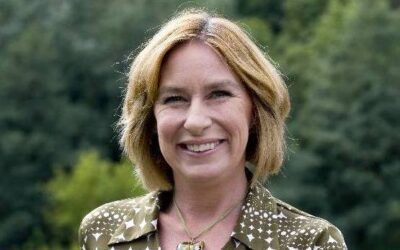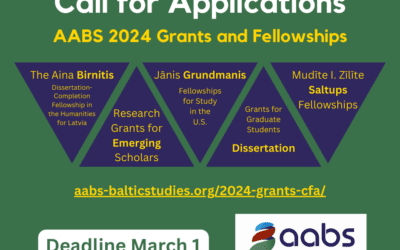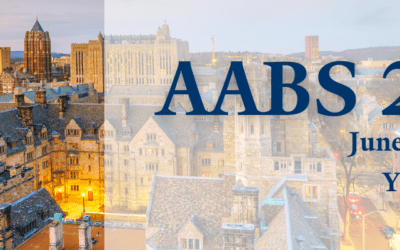AABS is pleased to recognize Elīna Vikmane for the completion of her dissertation “Advancing Cybermuseology: Diffusion of digital innovation in Latvia’s museum sector,” for which she received the 2022–2023 Aina Birnitis Dissertation-Completion Fellowship in the Humanities for Latvia.
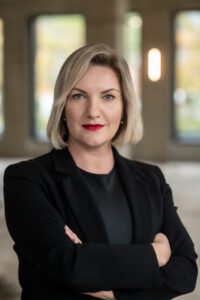
Elīna Vikmane
©Kristaps Kalns, 2023
Elīna Vikmane defended her PhD with the dissertation “Advancing Cybermuseology: Diffusion of digital innovation in Latvia’s museum sector,” at the Latvian Academy of Culture. Her research interests are mainly related to museum theory and practice with a focus on dynamics of digital advancement and the social role of culture and cultural heritage in particular. Vikmane has received numerous government and private sector grants to support her research. Her project “Striving Towards Participatory Engagement in Museums: Inquiry into Museum Education Practice in Latvia (MEET)” was a competitive selection by the Latvian Science Council in 2023.
Vikmane is a board member of the Latvian Museum Association, the Latvian Contemporary Art Museum Foundation, and a member of International Council of Museums.
The Impact of an Award: Report from Elīna Vikmane
After the completion of her dissertation, Elīna Vikmane submitted a reflection to AABS.
We thank her for her permission to publish her thoughts, which have been lightly edited.
On November 27, 2023, I successfully defended my doctoral thesis “Advancing Cybermuseology: Diffusion of digital innovation in Latvia’s museum sector” at the Latvian Academy of Culture.
First and foremost, I am deeply honoured and humbled to have been chosen for the Aina Birnitis Fellowship. It not only provides tremendous financial support for my academic journey but also validates my passion and dedication to my field of study. I would like to take this opportunity to say thank you to all the AABS community.
During the course of my PhD program, I became increasingly aware how broad the field is and how many tensions and issues can be explored, as you might guess. I focused towards studying the diffusion of digital innovations – how new digital ideas and practices spread among museums and how these changes relate to the understanding of fulfilling the core functions of museums.
I am immensely grateful to my supervisor, Prof. Anda Laķe, for her wise, sensitive, and empathetic approach, which allowed me to follow my instincts, to travel to different destinations till I find my path. Concepts such as diffusion of innovation, digital divide, and innovation champions came together at the right time. Furthermore, I gradually became convinced that I had sufficient arguments to offer a broader perspective to the theoretical framework of cybermuseology. I felt that previous efforts focusing on either digital technology, digital heritage, or the internet had unjustly limited the scope of investigation.
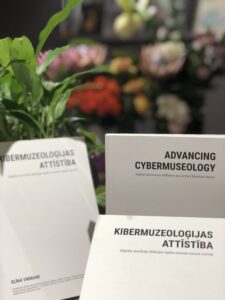
Figure 1. Vignette of Dissertation Defense
Photo ©Elīna Vikmane
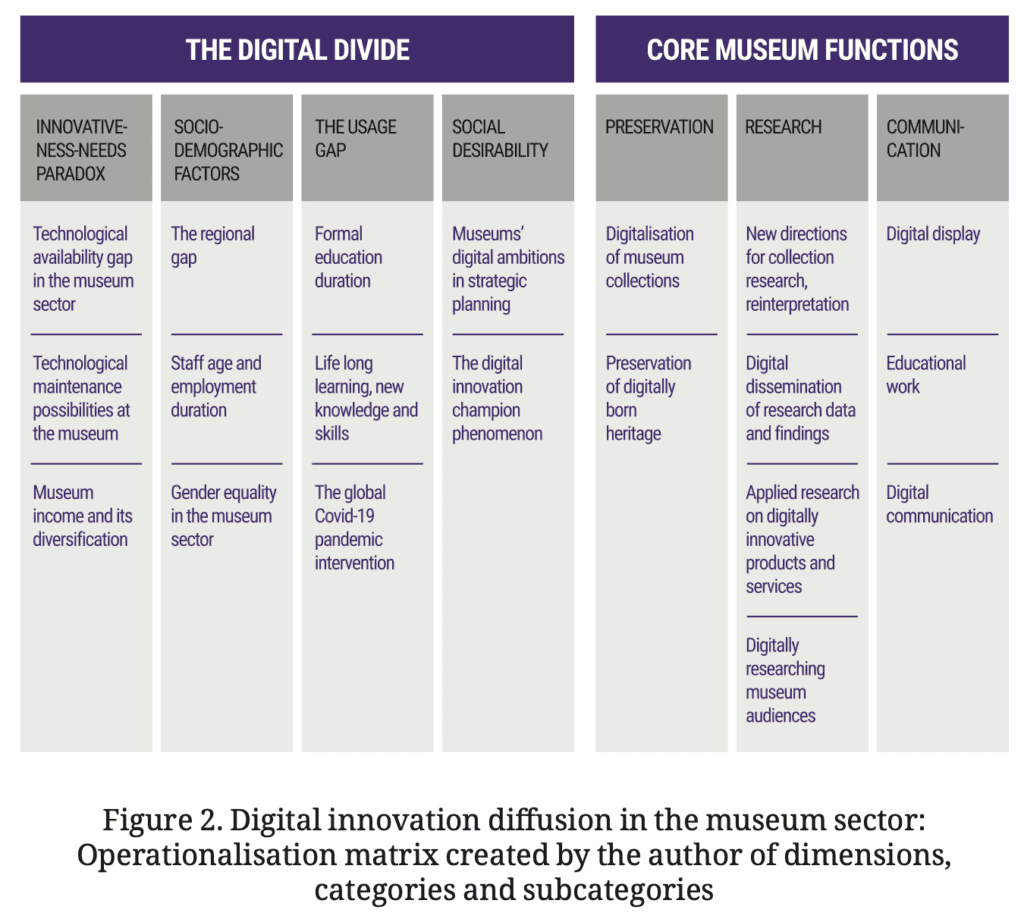
Then the world was hit by the COVID-19 pandemic. These were truly terrible times for people, but in a way, it created a vibrant study field for me. As museums were forced to close their doors for an extended period, they had to introduce new digital ideas and rethink their relationships with visitors in order to serve society, which lies at the core of the definition of a museum. The pace of change accelerated beyond what is typically observed. It also revealed the growing digital divide within the sector, differentiating museums that quickly adapted and embraced digital platforms from those that did not. My research questions became even more relevant, and it became clear that discussions on the subject of cybermuseology as the research field of theoretical and critical investigation of digital innovation in the museum field, would be timely. In addition, Latvia is a rare and beneficial research case where the state accreditation system distinguishes 111 museums from all other memory and heritage institutions and keeps an extensive database which is rarely used for research purposes.
The fellowship allowed me to prioritize my work on PhD thesis over other professional commitments and to work full speed throughout the summer and autumn. My doctoral thesis “Advancing cybermuseology: Digital innovation diffusion in Latvia’s museum sector” explores the seemingly inbuilt paradox between museums and digital innovation. On the one hand, we perceive museums as time-honoured institutions and guardians of tradition whose function is precisely to resist change. On the other hand, the inevitable digital influx, both institutionally and functionally, opens up rich opportunities to respond to persistent criticism of museums that need to change to serve society better.
Responding to the critical voices calling attention to insufficient discussion in museum theory and lack of representative research, I examine digital innovation diffusion in the museum sector, focusing on the institutional aspects against the backdrop of the digital divide and on museum attitudes and experiences fulfilling their three core functions, all in an attempt to expand the scope of cybermuseological research field.
I structured my thesis into six chapters. The first two present the theoretical framework. The third outlines the methodological principles of the empirical study. The fourth and fifth describe the author’s empirical study analysing primary quantitative data (representative survey), secondary quantitative data (statistics) and primary qualitative data (21 semi-structured interviews). The sixth chapter wraps up the thesis with conclusions, a consolidated argumentation and the recommendations drawn as implications from the study.
The novelty of my study is, first, that I push the boundaries of cybermuseology research by substantiating how digital innovation diffusion fits into theoretical museology and offering a broader and more inclusive definition of cybermuseology as a research field.
Second, to my knowledge, my thesis is the first-ever attempt at a representative study of innovation diffusion in a country’s museum sector. As such, it adds a new Latvian voice to the current interdisciplinary debate in the so called diffusionist community, emphasising its specific implications for cultural heritage field.
Third, my empirical research brings a new body of empirical knowledge about Latvia’s museum sector in the context of digital innovation diffusion, explaining the role of varying museum experiences and attitudes in how they perform their core functions whilst experiencing the digital divide.
Exploration of the multilevel elements of the digital divide exposes the specific nature of digital inequality in Latvia’s museum sector and gives new evidence of how digital divide can manifest in the broader heritage sector. I have managed to disprove some of the arguments found in earlier studies by other scholars and to identify a more nuanced argumentation, bringing new knowledge on the implications of the digital divide for digital innovation diffusion and the barriers to reducing digital inequality.
The thesis also contributes to development of terminology in Latvian language – the State Language Centre has supported my suggestion and ruled that “heritage-driven innovation” officially translates as “mantojumvirzīta inovācija”.
I would also like to express my gratitude to my anonymous reviewer at the Latvian Academy of Sciences for the positive feedback without remarks, and my official reviewers – Dr.sc.soc. Ilona Kunda, Dr. philol. Sanita Bērziņa – Reinsone, and Dr.art. Ieva Gintere for their diligent work and questions that gave us opportunity to discuss my research in detail, terminological issues and future perspectives.
I have come to realize that this fellowship also has have an enormous psychological impact, instilling a sense of confidence in me. This boost in confidence extends not only to the topic I have chosen or being more confident while defending my thesis, but also to my abilities as an emerging scholar. For example, I overcame fear and agreed to give a lecture to a group of international students in Germany and it went truly well, I developed bolder reasoning in the article I recently submitted, and I feel more belonging to the research community and being able to grow and to develop my skills further.
I consider myself very fortunate. Our team of researchers has secured funding through a highly competitive process for a three-year research project in Latvia aimed at exploring participatory practices in museums. Only 7,5% proposals received funding. This opportunity allows me to utilize the data and knowledge from my thesis while also delving into an uncharted field—post-qualitative research and participatory methods. The unknown aspect of this endeavor fills me with excitement, as I thoroughly enjoy the process of putting the puzzle together.
I am also particularly interested in the study of digitally born heritage, which is an emerging issue in Latvia, and in investigating how digitalisation change sthe power dynamics among memory institutions and broader ecosystem. Hence, I hope to find opportunities for international guidance for postdoc research. Questions such as what Latvians consider important and worth preserving 21st century digitally born heritage from the postdigital perspective, why, and whose heritage it is, whom and how represents, who can be considered collectors and what are power asymmetries, intrigue me. I believe that these initial thoughts will turn into something else during the process and it excites me, brings me joy. As we say in Latvia, when talking about the future we are sending a message to the universe, so now I have to keep my antennas alert not to miss the opportunities.
It is highly encouraging to continue pursuing an academic and scientific path and to spread the word about this opportunity among fellow PhD students and colleagues, making them aware that such a wonderful outcome which I considered almost a miracle is possible. Thank you AABS for all the phenomenal work you are doing!
– Elīna Vikmane
Elīna Vikmane
What is the Birnitis Fellowship?
The Aina Birnitis Fellowship supports a year of research and writing to help advanced graduate students in the humanities in the last year of Ph.D. dissertation writing. The fellowship provides a $21,000 stipend for one year plus $1,000 for university fees.
The application deadline for academic year 2024-2025 is March 1, 2024. Applications will be evaluated by the AABS 2023–2024 Grants Committee consisting of AABS VP for Professional Development Dr. Kaarel Piirimäe, AABS President Dr. Dovilė Budrytė, and AABS Director-at-Large Dr. Daunis Auers. Award notifications will be made in spring 2024.
Other Grants and Fellowships News
Vanished Lands: Book Publication Subvention Report by Laima Vincė Sruoginis
The Association for the Advancement of Baltic Studies (AABS) is pleased to recognized the successful conclusion of a Book Publication Subvention Grant awarded to Peter Lang Publishers for publishing the book Vanished Lands: Memory and Postmemory in North American...
AABS 2024 Grant and Fellowship Applications Open
Call for Applications AABS 2024-2025 Grants and Fellowships Research Grants for Emerging Scholars The Aina Birnitis Dissertation-Completion Fellowship in the Humanities for Latvia Mudīte I. Zīlīte Saltups Fellowships Jānis Grundmanis Fellowships for...
AABS 2024 Conference Travel Grants for Students and Early Career Scholars
The Association for the Advancement of Baltic Studies invites students and early career scholars who have been accepted to present at the 29th Biennial AABS Conference “The Baltic Way: Unity and Giving Aid“ (June 13–16, 2024, New Haven) to apply for travel grants to...

